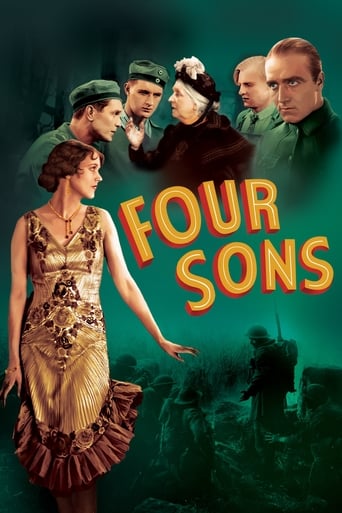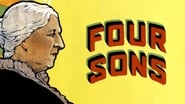Joel Archer
John Ford is truly great filmmaker this is the pinnacle (well in my opinion) of silent film. Margaret Mann is a revelation her performance is so enthralling especially in some of the final scenes at the end of the picture.The story is a strong one but the direction and the way it is put together is truly sensational Ford himself is Irish and this film i feel may be close to his roots.I was amazed the film didn't have many title cards however it was so simple to follow and by the end of it you're moved by mann's performance. you feel and care for the characters the whole way through that's the mark of a great film.And for the film buffs watch the early scenes in the film you got to love the tracking shot the mark of master John Ford
MartinHafer
When this film begins, you'll no doubt notice how beautiful the cinematography is as well as the accompanying musical score. Although this is a silent film, technically it is lovely--one of the prettiest silents I have ever seen--and I have seen a ton of them! The way shots were framed, the camera angles and the composition were perfect. All this is very evident--even with a print that is far from perfect.The next thing I noticed was the look of the film itself. Perhaps it was because the film was made only a decade after WWI, but regardless, the look of the villages, the characters and the costumes were great. The muttonchops, the clothes, the haircuts, the buildings--everything looked as if it were filmed in Bavaria at about 1910. As a former history teacher, I had to admire this attention to detail.The story is about a family in which a widow has four sons. One of them, a gentle soul, will eventually go to America and the other three good sons will stay behind. Ultimately, you know that this will bring the three into conflict during WWI--but all this is much later in the film. The only inkling of this are scenes involving one son (who is in the military) and some nasty stereotypical career German officer who struts about the town-showing his contempt for pretty much everyone--an obvious allusion to German militarism.Later, when the war comes, the family is destroyed. Three sons fight for the Germans and the fourth fights for his adopted land, America. This is all very touching and sad. There is even a scene where the American son meets one of his dying brothers on the battlefield. It, too is touching, but also a bit ridiculous--after all, what were the odds against such a meeting?! Following the war, the three sons who fought for Germany are dead and the surviving son returns to America. Soon, he sends for his mother and in a touching series of scenes, she's off to a new land. Oddly, to get into the country, according to the film, a person needed to know the alphabet! And, since she is unschooled, this poses a bit of a problem. In an odd mix-up, however, she leaves Ellis Island and gets lost in the crowd--not knowing the language and having no idea how to find her beloved Joseph. Fortunately, all is well--leading to one of the finest and most sentimental endings I have ever seen.Overall, a wonderful silent--one of the best. It not only is technically well made, but is incredibly sentimental and shows an aspect of American history that has been mostly forgotten. A great film--one of the best of the era--yet sadly few today have heard of it. So why is this film currently only rated 6.9 on IMDb?
dglink
Sentimental, but not mawkish, the early John Ford silent, "Four Sons," is a well made film that exemplifies early 20th century values. The four sons of a Bavarian widow are swept up in the events of World War I. Three of the boys fight for the Kaiser, while the fourth, who had emigrated to the United States, is on the opposite side. The screenplay does not dwell on politics, although the German officers have villainous characters, and the American son chastises an employee for advocating war, because "America is neutral." Most of the action takes place in a small village in Bavaria, and the unspoken message is that ordinary Germans are as kind and feeling as people everywhere.Despite a predictable storyline, the performances avoid the "grand style" that gave silent acting a bad name. Made in 1928 at the apogee of the American silent era, John Ford's direction is solid, and the film foreshadows his adaptation of "How Green Was My Valley" more than a decade later. Certainly the two strong mothers who suffer the absence of their sons have much in common. If John Ford had not directed "Four Sons," the film could have been largely forgotten. Plot holes abound, and coincidences occur that "only happen in the movies." However, the film is a good example of popular entertainment in the late silent era, and modern audiences will likely be engaged, especially students of Ford and those with an affection for silent movies.
finki
This classic John Ford masterpiece has been spoiled by bureaucratic incompentece.Somebody in 20th Century-Fox has decided to remove the original Movietone soundtrack and replace it with an inappropriate score. it seems that for certain people, the original intentions of director John Ford were no good enough for today. Hence, the film was stripped of its sound... which means that we do not have the film as it was originally intended to be seen.Even though in most parts of the world, as well here in the United States, most people saw the film in a silent version, the original soundtrack is a crucial element of the film and without it, the experience is incomplete.A great film, but avoid the DVD until an authentic restored version with the original soundtrack becomes available.


